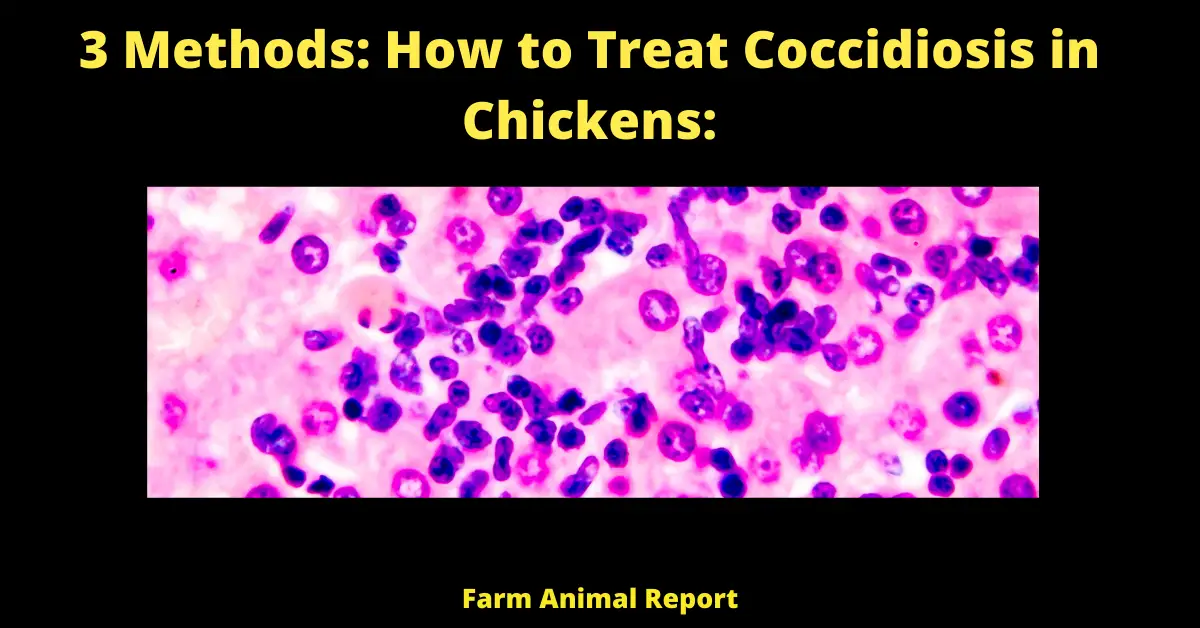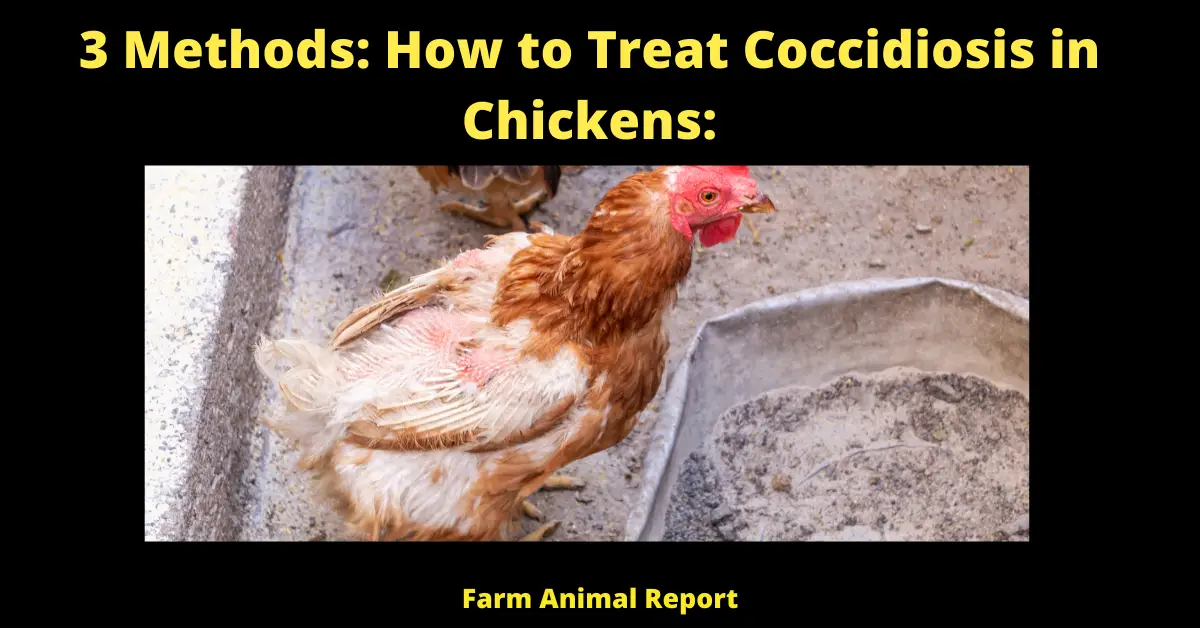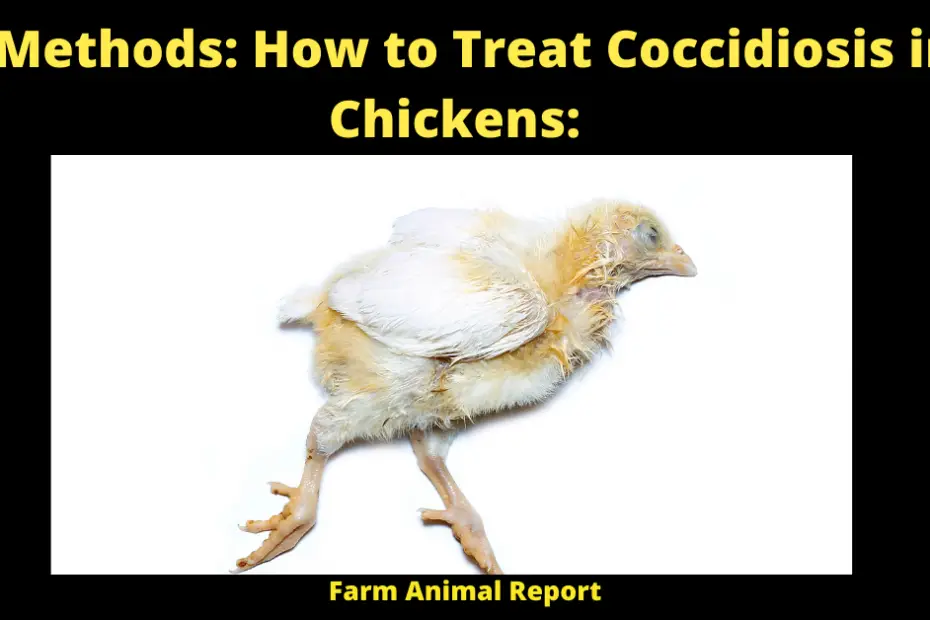If you’re a chicken keeper, then you need to be aware of coccidiosis and how to treat it. This deadly disease can kill your flock in a matter of days, so it’s important to know what to do if you see the signs. In this blog post, we will discuss the different methods of treatment for coccidiosis and how to choose the right one for your flock.
3 Methods: How to Treat Coccidiosis in Chickens?
- Vaccination
- Probiotic
- Medicated Feed
How do Chickens get Coccidiosis?
Chickens are susceptible to a disease called coccidiosis, which is caused by the protozoan parasites of the Eimeria genus. The parasites infect the chicken’s intestines, where they reproduce and cause damage to the lining of the gut. Coccidiosis can lead to severe diarrhea, dehydration, and death in chickens. Merck Vet Manual says this How to Treat Coccidiosis in Chickens?

The disease is spread through contaminated food or water, or contact with infected feces. Chickens typically become infected when they are young, but older birds can also be affected.
Treatment for coccidiosis generally involves the use of antibiotics. Prevention is the best defense against the disease, and good hygiene practices can help to reduce the risk of infection.
What is the Life Cycle of Coccidiosis Protoza Elimeria Genus?
Coccidiosis is caused by a microscopic protozoan of the genus Eimeriidae. There are four life stages to the coccidia life cycle:
- Egg (called an oocyst),
- Trophozoite,
- Schizont,
- Merozoite.
The first stage, the egg, is resistant to drying and freezing and can survive in the environment for long periods of time. When ingested by a host, the egg hatches in the intestine and releases a number of trophozoites.
The trophozoites then invade the epithelium of the intestine and begin to multiply. This multiplication results in the formation of schizonts, which contain many merozoites. The merozoites are released from the schizonts and invade new epithelial cells, beginning the cycle anew.
Clinical signs of coccidiosis include lethargy, anorexia, weight loss, diarrhea, and dehydration. In severe cases, death may occur. Treatment typically involves the use of antiprotozoal drugs such as sulfonamides or coccidiostats. Prevention is achieved through good sanitation practices and regular cleaning of Animal housing facilities.
How Long can Coccidiosis Eggs Survive?
Coccidiosis is a disease caused by infection with coccidian protozoa. These parasites cause damage to the lining of the intestine, leading to diarrhea and significant weight loss.
Coccidiosis is a major problem in poultry farming, as it can quickly spread through a flock and lead to high levels of mortality. The parasites are typically transmitted via contaminated food or water, and they can also be passed from one bird to another.
Once ingested, the coccidian parasites undergo several rounds of replication before they are finally excreted in the bird’s feces. The eggs of these parasites can survive for long periods of time in the environment, making them a potential source of infection for future generations of birds.
The exact length of time that the eggs can survive depends on a number of factors, including temperature and humidity levels. However, under ideal conditions, coccidian eggs can remain viable for months or even years. As a result, coccidiosis remains a significant threat to poultry farms around the world.

What are the Symptoms in Chickens?
- Slow Growth
- Loose Watery Stool
- Blood in Stool
- Dehydration
- lethargy
- anorexia
How do Chickens get Coccidiosis?
Chickens are susceptible to coccidiosis, a disease caused by the protozoan parasites of the genus Eimeria. Chickens become infected with coccidiosis when they consume food or water contaminated with Eimeria oocysts.
The oocysts mature in the chicken’s intestine, and each oocyst can produce up to thousands of infectious cysts. Chickens can also become infected with coccidiosis through contact with an infected bird. Chickens typically show no symptoms of coccidiosis until the parasite has reached maturity and started producing cysts.
At this point, chickens may experience diarrhea, weight loss, dehydration, and death. Coccidiosis is a serious disease that can decimate a flock, so it is important for chicken owners to be aware of the signs and symptoms.
Prevention is the best defense against coccidiosis, and good hygiene practices can go a long way toward preventing infection.
Can Chickens Develop Natural Immunity to Coccidiosis?
Coccidiosis is a parasitic disease that affects the intestinal tract of chickens and other poultry. The disease is caused by protozoan parasites of the genus Eimeria, which infect the cells lining the intestine.
Chickens can develop natural immunity to coccidiosis, but this takes time and exposes them to a certain amount of risk.
- Gradual Exposure – In order to develop immunity, chickens must be exposed to low levels of infestation with coccidial parasites. This can be done by housing birds in an environment where coccidial oocysts are present, such as in dirt or on contaminated equipment.
- Overcoming Illness – a Chicken that survives will have some natural Immunity
What can you do to Prevent Coccidiosis in your Flock of Chickens?
- Prevent Damp
- Prevent Overcrowding in Housing
- Raise on Wire If Possible
- Change and dispose of Bedding Often
- Avoid Hot-Humid conditions – ( Coccidiosis breed rapidly)
- Clean uncontaminated Water
Are there any Home remedies for Backyard Chicken Keeper that can be used to treat Coccidiosis in Chickens?
While there are many commercial treatments available, there are also some simple home remedies that can be used to treat this disease. One of the most effective home remedies is to add garlic to the chicken’s water.
Garlic has natural antibiotic properties that can help to kill the bacteria that cause coccidiosis.
Another home remedy is to feed the chicken’s a diet that is high in vitamin A.
This vitamin helps to boost the immune system and can also help to fight off infection. Lastly, adding apple cider vinegar to the chicken’s water can also help to treat coccidiosis.
The acidity of the vinegar helps to create an unfavorable environment for the bacteria, making it more difficult for them to survive. By using one or more of these home remedies, you can help your chickens recover from coccidiosis and prevent it from coming back.
How long does it take for a Chicken to Recover from a Coccidiosis Infection?
Coccidiosis is a parasitic disease that affects the intestines of birds, particularly chickens. The parasite infects the lining of the intestine, causing severe diarrhea and dehydration.
In severe cases, coccidiosis can be fatal. Recovery from the disease generally takes 7-10 days, although some chickens may experience relapses. Treatment typically involves the use of antibiotics, which can help to clear the infection and prevent further damage to the intestine. In addition, it is important to provide plenty of fresh water and food to encourage chickens to drink and eat.
This will help to prevent dehydration and restore nutrients that have been lost due to diarrhea. Chickens that have recovered from coccidiosis should be isolated from healthy birds to prevent the spread of the disease.
What is a Coccidiostat In Chicken Feed?
A coccidiostat is an anticoccidial, which is a drug used to prevent or control the spread of coccidiosis. Coccidiosis is caused by protozoa of the genus Eimeria, and it is a significant disease in poultry. Infected birds show decreased appetite, weight loss, and bloody diarrhea. In severe cases, coccidiosis can be fatal.
Coccidiostats are used in chicken feed to help prevent the spread of coccidiosis. They work by inhibiting the growth of the protozoa that cause the disease.
This allows chickens to build up immunity to the disease and reduces the chances of them becoming sick. There are many different types of coccidiostats available, and they can be used in both commercial and backyard chicken operations. When used correctly, coccidiostats are an effective tool in preventing coccidiosis.
What Types of Medicated Starter Chicken Feeds?
Chicken feed that contains medication can be a useful tool for preventing disease in your flock. However, it’s important to choose the right type of feed for your chickens and to use it correctly.
There are two main types of medicated chicken feeds those that contain antibiotics and those that contain coccidiostats.
- Antibiotic-medicated feeds are used to prevent or treat bacterial infections,
- Coccidostat-medicated feeds are used to prevent or control coccidiosis, a common intestinal disease caused by protozoa. When using any type of medicated feed, it’s important to follow the directions on the package carefully.
- Overusing or misusing antibiotics can lead to antibiotic resistance, which is a serious public health concern. If you have any questions about using the medicated chicken feed, talk to your veterinarian or poultry specialist.
How does Amprolium help with chickens that have Coccidiosis?
Amprolium is an ionophore that is used to treat and prevent coccidiosis in chickens. It works by inhibiting the uptake of thiamine, which is essential for the life cycle of the parasite. Amprolium is available in both oral and injectable forms, and it is typically given to chickens for 7-14 days. In most cases, amprolium is effective at treating coccidiosis; however, it may not be effective against all strains of the disease.
Can Humans get Coccidiosis from Chickens?
Coccidiosis is a parasitic disease that can affect the intestines of both humans and animals. Though it is most commonly seen in young animals, such as calves and kittens, it can also infect adults. Chickens are particularly susceptible to coccidiosis, and the disease can be passed from chickens to humans.
Symptoms in humans include diarrhea, fever, and abdominal pain. In severe cases, coccidiosis can lead to death. Coccidiosis is treated with antibiotics, and prevention is the best way to protect yourself from the disease. If you own chickens, make sure to clean their coop regularly and wash your hands after handling them. If you think you may have coccidiosis, see a doctor immediately.
Can Humans get Coccidiosis from eating contaminated Chicken Meat?
Coccidiosis is a disease caused by the protozoan parasites of the genus Eimeria. These parasites infect the intestines of chickens and other poultry, causing bloody diarrhea and severe weight loss. In some cases, coccidiosis can be fatal. Humans can contract coccidiosis from eating contaminated chicken meat, but this is rare. The vast majority of cases occur in developing countries, where sanitation conditions are poor and poultry are often kept in close quarters. Treatment for coccidiosis includes the use of antibiotics and antidiarrheal medications. In severe cases, hospitalization may be necessary. Prevention of coccidiosis is through good hygiene practices and prompt treatment of infected animals.
Can you eat Eggs from Chickens with coccidiosis?
Coccidiosis is a common disease among chickens that is caused by the Protozoan parasites. The parasites can cause severe diarrhea and dehydration in chickens, and in some cases, death.
However, coccidiosis is not a food-borne illness and cannot be transmitted to humans through Eggs. In fact, Eggs from Chickens with coccidiosis are safe to eat and pose no risk to human health.
While the disease can be deadly to Chickens, it is easily treatable with medication. Therefore, if you see evidence of coccidiosis in your flock, be sure to consult a veterinarian and begin treatment as soon as possible.
Final Thoughts – How to Treat Coccidiosis in Chickens?
Coccidiosis can be treated by:
- Vaccinations
- Antibiotic Feeds
- Coccidstat Feeds
- Probiotics
God Bless Greg





